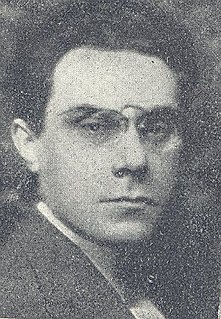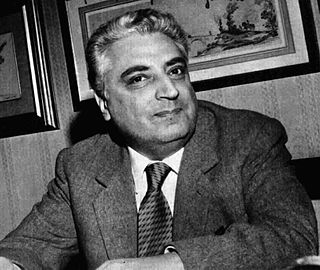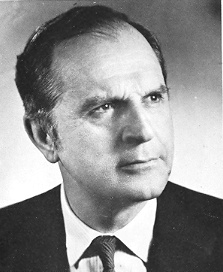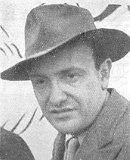Biography
Partisan activity
During these years, Alicata came into contact with many young antifascist students, such as Pietro Ingrao, Carlo Salinari, Mario Socrate, Carlo Muscetta, Aldo Natoli, Lucio Lombardo Radice, Paolo Alatri and Paolo Bufalini. He also collaborated with the Roman newspaper Il Piccolo , Giuseppe Bottai's journal Primato , the literary weeklies Il Meridiano di Roma and La Ruota . He secretly enrolled in the Italian Communist Party in 1940, the year in which he graduated with his these Vincenzo Gravina e l'estetica del primo Settecento (Vincenzo Gravina and the Aesthetic of the early Eighteenth century). He then became the assistant of Natalino Sapegno, who had been his supervisor.
In 1941 he became an editor in the Roman office of the publishing house Einaudi with Giaime Pintor and Carlo Muscetta. There he dramatised several stories of Giovanni Verga for the cinema and worked for Luchino Visconti on the film Ossessione (based on James M. Cain's The Postman Always Rings Twice ), which was destroyed in 1943 by the Fascist authorities amid controversy.
He married Giuliana Spaini in December 1941. He was arrested the next year and was freed with the fall of Fascism. He participated in the resistance against the German occupiers in Roma, running Il Lavoro italiano the united journal of the labour unions with the Christian democrat Alberto Canaletti Gaudenti and the socialist Olindo Vernocchi. He was secretly among the editors of l'Unità , directed by Celeste Negarville.
Political and literary career
Immediately after the liberation of Rome, he became part of the government of the Comune of Rome. From 1945 to 1948 he directed the Neapolitan newspaper La Voce, in 1946 he was elected as a local councillor for Naples, in 1949 he directed the communist weekly La Voce del Mezzogiorno with Giorgio Amendola. In the election of 18 April 1948 he was elected to the Chamber of Deputies from the district of Napoli-Caserta. Thereafter he was named Regional Secretary of the Communist party in Calabria and became a member of the central committee of the Italian Communist Party.
In 1950 he became part of the secretariat of the national committee for the revival of Southern Italy, which set up an investigation of the conditions of the southern people, published in La Voce del Mezzogiorno. He was spokesman for the minority in the Parliamentary commission which discussed the results of the investigation. Re-elected as a Deputy in 1953 and 1958, for the district of Catanzaro-Cosenza-Reggio Calabria, he was also Mayor of Melissa, Calabria from 1953.
Against Elio Vittorini he claimed he was convinced the arts ought to help "men in the fight for justice and liberty," [2] in a polemic continued by Palmiro Togliatti on the theme of the relationship between politics and culture. Against Carlo Levi and Rocco Scotellaro, Alicata maintained that the revival of the southern farmers could be obtained through "the alliance and the direction of the working class" which would fight against "the traditional enemies of the South: the agro-industrial bloc, Italian and foreign imperialism." [3]
From 1954 to 1964 he directed the journal, Cronache meridionali with Giorgio Amendola, Francesco De Martino, Gerardo Chiaromonte, Giorgio Napolitano, Rosario Villari and others. He directed the Cultural Commission of the Italian Communist Party from 1955, was a member of the Party directorate from 1956 and was director of L'Unità from 1962. He signed the editorial of the first issue of the theoretical journal Critica marxista in February 1963, the same year in which he was reelected as Deputy from the district of Siena. From 1964 he was a member of the Secretariat of the Communist Party.
In August 1966, he denounced the damage done to Agrigento by real estate speculation and in his final speech in the chamber he accused the managerial class of being incapable of protecting Italy's artistic patrimony. He died suddenly at Rome on 6 December 1966, aged forty-eight.

Agostino Lanzillo was an Italian revolutionary syndicalist leader who later became a member of Benito Mussolini's fascist movement.

l'Unità was an Italian newspaper, founded as the official newspaper of the Italian Communist Party (PCI) in 1924. It was supportive of that party's successor parties, the Democratic Party of the Left, Democrats of the Left, and from October 2007 until its closure the Democratic Party. The newspaper closed on 31 July 2014. It was restarted on 30 June 2015, but it ceased again on 3 June 2017.

Renzo De Felice was an Italian historian, who specialized in the Fascist era, writing, among other works, a 6000-page biography of Mussolini. He argued that Mussolini was a revolutionary modernizer in domestic issues but a pragmatist in foreign policy who continued the Realpolitik policies of Italy from 1861 to 1922. Historian of Italy Philip Morgan has called De Felice's biography of Mussolini "a very controversial, influential and at the same time problematic re-reading of Mussolini and Fascism" and rejected the contention that his work rose above politics to "scientific objectivity", as claimed by the author and his defenders.

Giovanni Amendola was an Italian journalist and politician, noted as an opponent of Italian Fascism.

Antonello Trombadori was an Italian politician, art critic and journalist.

Ugo La Malfa was an Italian politician and an important leader in the Italian Republican Party.

The Manifesto of the Anti-Fascist Intellectuals, written by Benedetto Croce in response to the Manifesto of the Fascist Intellectuals by Giovanni Gentile, sanctioned the irreconcilable split between the philosopher and the Fascist government of Benito Mussolini, to which he had previously given a vote of confidence on 31 October 1922. The idea of an anti-Fascist manifesto came to Giovanni Amendola, who wrote to Croce, a proclaimed anti-Fascist, for his opinions on 20 April 1925:
Dear Croce, have you read the Fascist manifesto to foreign intellectuals? ... today, I have met several people who feel that, following the publication of the Fascists' document, we have the right to speak and the duty to respond. What is your opinion? Would you be willing to sign such a document, or even write it yourself?

Aldo Fabrizi was an Italian actor, director, screenwriter and comedian, best known for the role of the heroic priest in Roberto Rossellini's Rome, Open City and as partner of Totò in a number of successful comedies.
The Nastro d'Argento is a film award assigned each year, since 1946, by Sindacato Nazionale dei Giornalisti Cinematografici Italiani, the association of Italian film critics.

Paolo De Stefano was an Italian mobster and member of the 'Ndrangheta who became the undisputed boss of Reggio Calabria. Together with his brothers Giovanni, Giorgio and Orazio he headed the De Stefano 'ndrina.

Claudio Amendola is an Italian actor, television presenter and director. He starred in the 1993 film The Escort, which was entered into the 1993 Cannes Film Festival.
The De Stefano 'ndrina, or the De Stefano family or De Stefano-Tegano family, is one of the most powerful clans of the 'Ndrangheta, a criminal and mafia-type organisation in Calabria, Italy. The 'ndrina hailed from the Archi neighbourhood in Reggio Calabria. Several of its members were included in the list of most wanted fugitives in Italy. According to prosecutor Salvatore Boemi, the De Stefanos are the representation of the manager-criminal controlling a crime multinational with joint ventures with Raffaele Cutolo from the Camorra and Nitto Santapaola and Francesco Ferrera from Cosa Nostra in Catania.

Paolo Orsi was an Italian archaeologist and classicist.
Corrente di Vita was a biweekly Italian culture magazine published between 1938 and 1940.

Ruggero Grieco was an Italian politician, antifascist, and member of the Italian Communist Party. He was born in Foggia, Apulia.

Paolo Alatri was an Italian historian and Marxist politician.

Il giustiziere di mezzogiorno is a 1975 Italian comedy film written and directed by Mario Amendola. It is a parody of Death Wish.
Paolo Orsini was an Italian condottiero in the service of the Papal States, Ferdinand of Aragon and the Republic of Florence. He was marquess of Atripalda and lord of Mentana, Palombara Sabina and Selci.
This page is based on this
Wikipedia article Text is available under the
CC BY-SA 4.0 license; additional terms may apply.
Images, videos and audio are available under their respective licenses.














